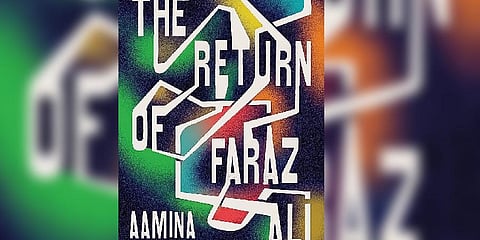

Before your imagination has lent faces to the characters in Aamina Ahmad’s debut novel, The Return of Faraz Ali, you are already gripped with the emotional turbulence of the strongest kind. What starts
as a crime novel set in Lahore, Pakistan, in the 1960s, soon reveals itself to be a socially aware fictional tale of power and injustice. The heart of Faraz Ali’s story lies at the convergence of caste, class, crime and gender, and Ahmad resuscitates the history of Pakistan and Bangladesh in this ambitiously intricate narrative.
The protagonist was five years old in 1948 when he was taken away from his mother by his father Wajid, in an attempt to provide him with a life away from the label of a kanjar (prostitute). Cut to 1968. Faraz is now a policeman. Aware of his origins in the Mohalla (the red light district in the city), we learn that he has grappled with the term kanjar throughout his 20-year-old life, even as he has repeatedly tried to find his mother and sister.
Faraz’s search finds a fresh boost when he is deputed by his influential, yet never-publicly-acknowledged, father to clean up a case involving the murder of a young girl in the Mohalla. Thus begins a tale of revolution, both inward and outward, as the streets of Pakistan come abuzz with chants of “Bhutto”. Divided into three parts, the book flits through Pakistan and reaches modern-day Bangladesh, where the country is on its way to becoming independent. When Faraz fails to execute the cover-up job back home, he is demoted and sent eastwards. His trauma is depicted perfectly in Ahmad’s unique prose that does not mince words to describe the scenes of brutality on the streets of Dacca.
In parallel, runs the story of Wajid, posted in North Africa, at the brink of the end of World War II. The abrupt jumps in the narrative act as an agent of force, compelling the readers to get immersed in the character arcs. Against the backdrop of Pakistani President Muhammad Ayub Khan’s reign, Faraz, an agent of the state, finds himself in the middle of moral ambiguity that further deepens his need to repay his father’s supposed debt and also unearth his illegitimate past. As he gets lost in the lanes of the Mohalla, trying to stand by what is right, we discover the strong-willed women of the district who, despite being born to a predetermined future, are in complete control of their personal narrative.
Faraz’s tender relationship with his young daughter is juxtaposed with his unanswered questions for his mother and his idea of fatherhood from his learnings and expectations from Wajid. The atmosphere of Ahmad’s debut novel is tense through all 367 pages, and the author’s intent is deliberate and measured. Every sentence, whether it’s the conversations peppered with Urdu curse words or heartwarming moments between characters, reveals steps to a masterplan that is ubiquitous—to let readers make their own choices.